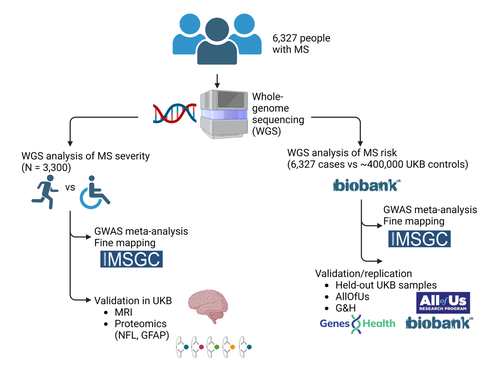
2024 Post-doctoral Clinical Fellowship
Understanding genetic determinants of Multiple Sclerosis risk and severity through whole-genome sequencing
Multiple Sclerosis (MS) is an autoimmune disease of the brain and spinal cord which results in gradual accumulation of physical and cognitive disability over time. MS affects over 2 million individuals worldwide and is a leading cause of neurological disability among young adults. Disease-modifying therapies (DMT) are highly effective in suppressing relapses, but to date have only shown limited efficacy in progressive disease, suggesting that the processes driving inflammatory relapses and progression are at least partially distinct. There is therefore a clinical and economic unmet need to understand the underlying mechanisms of disease progression and develop therapies which slow, or prevent, disability progression in MS.
Genetic studies can provide insights into the biology of MS. Previous genetic studies of MS risk and severity have focused on common variants assessed with genotyping arrays. These large-scale efforts conducted by the International MS Genetics Consortium have demonstrated that both MS risk and severity are heritable and polygenic traits. The genetic architecture of risk is rooted in the immune system, whereas variants which influence MS severity implicate genes involved in nervous system function. However, genotyping arrays offer biased coverage of the genome, and are not well-suited to assess the impact of certain types of genetic variation, such as low-frequency coding variants.
This project will explore the impact of low-frequency coding variation on MS risk and severity using a unique cohort assembled by Prof. Stephen Sawcer (University of Cambridge) consisting of people with MS who have undergone whole-genome sequencing (WGS). We will integrate our findings with prior genetic association study results to refine the association signals at established loci, and we will attempt to validate our findings using external datasets. Our results will help to refine how we understand the genetic landscape of MS risk and severity.

Follow up after fellowship:
Benjamin has progressed to Clinical Lecturer position in Queen Mary University of London.